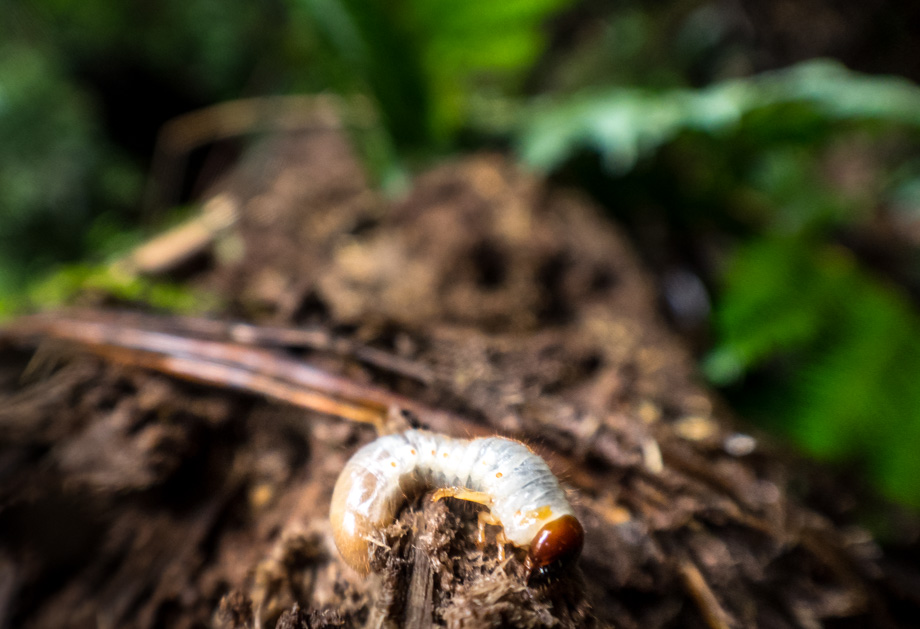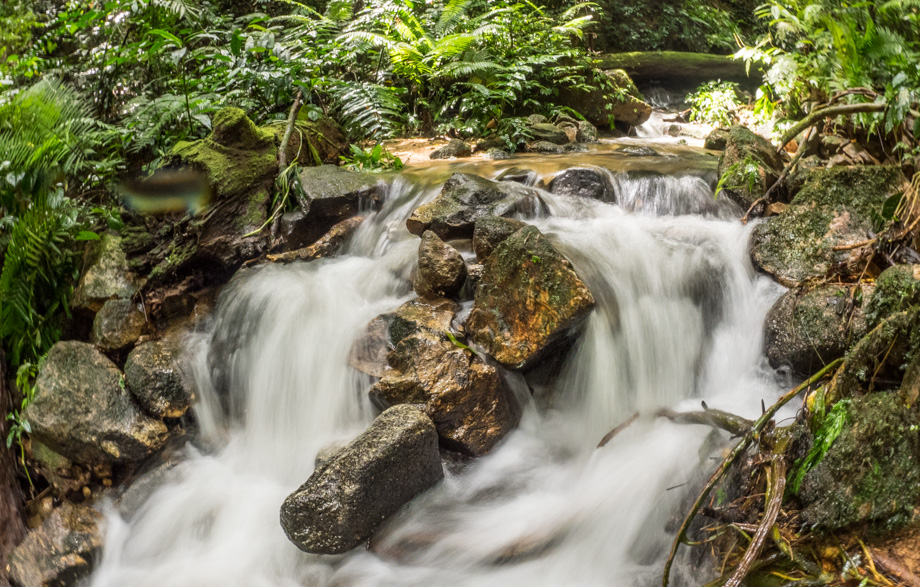GBB (CUS Connection) - Day 2
Rata Air to Huhuhu Camp

We finally began the day's hike after an agonising wait for the rest of the group, who spent the morning dilly-dallying as if they had all the time in the world. We left at 10:15, more than two hours later than had been planned, and made our way down to the river that flanked the '
Rata Air' campsite. The riverside was quite scenic in the daylight, and the sunlight glinted off the pools of water that were partially barricaded by large fallen logs. The trickling of water as it flowed over the cascades was very pleasant, and the entire area was shaded by the huge leaves of wild banana trees
(Musa sp.) and the fanned leaves of towering ferns.
We stepped across the river and climbed up the other side of the riverbank only to find that the path ahead was completely blocked by the trunks of fallen trees. The entire area was blanketed with overgrown vegetation, and this slowed us down considerably as we had to spend a while just to cut our way through. There was a stillness that lingered in the air, and at first glance it seemed as if the place was devoid of activity. Upon closer inspection however, one could see a huge number of things happening, but just on a time and a scale that was imperceptible to us. The stillness must have been too much for some of the others though, as someone up ahead began to play some music from their phone. I immediately stopped walking in order to drop behind and out of earshot, as I had not come all this way to let rap music drown out the sounds of nature.
 A wall of bamboo shoots (Tribe : Bambuseae)
A wall of bamboo shoots (Tribe : Bambuseae)
The best thing about slowing down and taking your time is that you begin to notice things that you otherwise may not. Tiny movements in rotting wood caught my eye, and it turned out to be a grub worm that was squirming about. Grub worms are basically the larvae of beetles, and are generally beneficial to the life cycle of the forest as they help to convert cellulose into nutrients for the soil. They can be considered pests though, especially in places where people care about trivial things like the health of the grass in their gardens. This is because grub worms spend their entire larval stage underground where they feed on roots, and which over time, will inevitably create patches of dead grass.
Another creature that I noticed squirming--or rather, gliding slowly--on the forest floor was a massive fire snail
(Platymma tweediei). These striking gastropods are the largest native land snails in the whole of Peninsular
Malaysia. They only live in the montane forests of the
Titwangsa Range, and require areas of high humidity in order to survive.
 A grub worm, or larva of a scarab beetle (Family : Scarabaeidae)
A grub worm, or larva of a scarab beetle (Family : Scarabaeidae)
 A massive fire snail (Platymma tweediei)
A massive fire snail (Platymma tweediei)
We eventually crossed another river to what was once known as '
Rata Camp', about 1.35 km into the day's hike. The campsite has been 'decommissioned', but the replacement campsite of '
Marigold Camp' lay slightly further up the trail. There was a small rock face of sorts here that was completely covered in moss, and parts of it revealed the spindly roots of the tree that was perched precariously above. As soon as we passed the second campsite, we veered sharply to the right and straight down to the river below. The river here was fairly wide, but it was also shallow and the flow was gentle enough to not require ropes for the
crossing.
We then crawled back up the steep bank on the other side of the river on our hands and knees, and then continued walking along the selaginella-lined trail just above. The trail ascended the slopes for half a kilometre or so, before rounding a rise and flattening out to a clearing just before the stream called '
Sarung Camp'. There was another steep climb not too long after, up a muddy slope with sporadic tree roots as handholds, which was then followed by a series of river crossings. The trail was now heading west and ran parallel to the river. It veered left down to the river about 3.5 kilometres in, but instead of crossing over to the other side this time around, we just stopped for a one-hour-long lunch break.
 One of the many rivers that we had to cross
One of the many rivers that we had to cross









